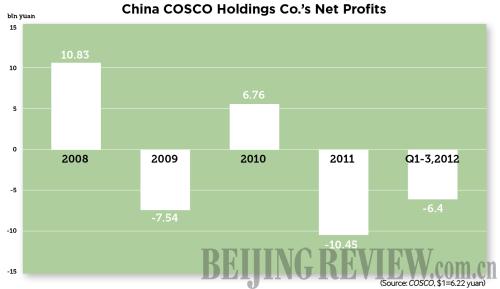|
The global shipping industry saw good times over a five-year period starting in 2003 when companies placed a large number of orders at shipyards across the world.
Making a big bet on China's robust economic growth, COSCO expanded its fleet of dry bulk carriers from 400 in 2007 to 450 in 2010. By June 30, 2012, COSCO had operated 357 dry bulk carriers, including a self-owned batch of 227 and a rented batch of 130 with a transport capacity of 18.93 million tons and 13.49 million tons respectively. Additionally, it had also placed orders for 18 new dry bulk carriers with a transport capacity of 1.67 million tons.
This blind expansion ultimately landed COSCO in severe difficulties. In 2011, the daily rental for a Capesize bulk carrier fell to $4,000, with ship-owners losing as much as $20,000 a day. Before the 2008 global financial crisis, a Capesize bulk carrier's operation and maintenance costs stood at $30,000 per day, and daily rental was as high as $260,000.
Wei Jiafu, Chairman of COSCO and President of the China Ship-owners Association, appealed at the Boao Forum for Asia in April 2012 for carriers worldwide to strengthen their cooperation and self-discipline and restrain from building more new ships.
Moreover, excess capacity led to the plummeting shipping fees charged by companies.
"In 2008, the shipping rate for imported coal was 150 yuan ($22) per ton. Now it's down to just over 20 yuan ($3) per ton, which means carriers are seeing big losses," said Luo Ning, Deputy Director of the Port and Shipping Administration Bureau of Zhoushan in Zhejiang Province.
Faced with persistent losses, carriers raised their rates in a concerted move in August 2012, but the excess capacity and resulting price war forced container shipping rates down by over $100 a week.
However, it is doubtful whether increasing rates will bring about greater profitability.
Despite a severe winter affecting the whole industry, some shipping enterprises managed to report profits.
AP Moller-Maersk Group, the largest container ship operator and supply vessel operator in the world, saw profits of $3.4 billion in 2011, despite a loss of $600 million in container transport, and its branch company Maersk Oil and Gas rolled in $2.1 billion. In the first half of 2012, the group also made $2.1 billion, though suffering a loss of $400 million in its shipping business.
As Liu Bin, a professor from Dalian Maritime University, notes, Maersk had long maintained its presence in some sectors which have a low correlation to the shipping industry, like retail, oil and gas, so the negative impact of the current downturn had been significantly buffered.
However, COSCO's over concentration on its main business dragged it into a resonance falling cycle. As its main businesses—container and dry bulk shipping and port operations—are interwoven with each other, when the storm swept over the shipping industry, there was no shelter. COSCO should make some adjustments to its current business structure to lower cyclical risks.
COSCO had taken some action to reverse its current plight, said Wei at the 2012 World Shipping (China) Summit held in Xiamen, Fujian Province, in September 2012.
"In fact, Maersk is also losing big money in its shipping business. But with its treasure bowl—offshore oil business, it managed to ride out of the storm," said Wei. "Now, we are trying to explore other means to build profit and cover losses."
Email us at: dengyaqing@bjreview.com

| 